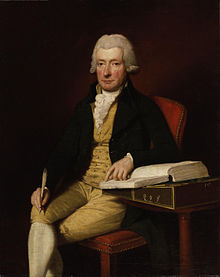
Miserere is a setting of Psalm 51 by Italian composer Gregorio Allegri. It was composed during the reign of Pope Urban VIII, probably during the 1630s, for the exclusive use of the Sistine Chapel during the Tenebrae services of Holy Week, and its mystique was increased by unwritten performance traditions and ornamentation. It is written for two choirs, of five and four voices respectively, singing alternately and joining to sing the ending in one of the most recognised and enduring examples of polyphony, in this case in a 9-part rendition.

"O for a Thousand Tongues to Sing" is a Christian hymn written by Charles Wesley. The hymn was placed first in John Wesley's A Collection of Hymns for the People Called Methodists published in 1780. It was the first hymn in every (Wesleyan) Methodist hymnal from that time until the publication of Hymns and Psalms in 1983.

Consecration is the transfer of a person or a thing to the sacred sphere for a special purpose or service. The word consecration literally means "association with the sacred". Persons, places, or things can be consecrated, and the term is used in various ways by different groups. The origin of the word comes from the Latin stem consecrat, which means dedicated, devoted, and sacred. A synonym for consecration is sanctification; its antonym is desecration.

Psalm 51, one of the penitential psalms, is the 51st psalm of the Book of Psalms, beginning in English in the King James Version: "Have mercy upon me, O God". In the slightly different numbering system used in the Greek Septuagint and Latin Vulgate translations of the Bible, this psalm is Psalm 50. In Latin, it is known as Miserere, in Ancient Greek: Ἥ Ἐλεήμων, romanized: Hḗ Eleḗmōn), especially in musical settings. The introduction in the text says that it was composed by David as a confession to God after he sinned with Bathsheba.

A lavabo is a device used to provide water for the washing of hands. It consists normally of a ewer or container of some kind to pour water, and a bowl to catch the water as it falls off the hands. In ecclesiastical usage it refers to all of: the basin in which the priest washes their hands; the ritual that surrounds this action in the Catholic Mass; and the architectural feature or fitting where a basin or place for one is recessed into the side wall of the sanctuary, or projects from it. If this last includes or included a drain, it is a piscina used for washing the church plate and other fittings, though the terms are often confused. In secular usage, it is an obsolete term for any sink or basin for washing hands, especially in a lavatory.

The Chaplet of the Divine Mercy, also called the Divine Mercy Chaplet, is a Catholic devotion to the Divine Mercy, based on the Christological apparitions of Jesus reported by Faustina Kowalska (1905–1938), known as "the Apostle of Mercy". She was a Polish religious sister of the Congregation of the Sisters of Our Lady of Mercy and canonized as a Catholic saint in 2000.
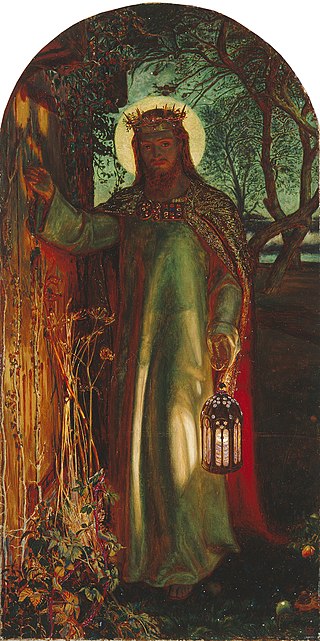
The Sinner's prayer is an evangelical term referring to any prayer of repentance, prayed by individuals who feel sin in their lives and have the desire to form or renew a personal relationship. This prayer is not mandatory but, for some, functions as a way to communicate with and understand their relationship with God through Jesus Christ. It is a popular prayer in evangelical circles. While some Christians see reciting the Sinner's prayer as the moment defining one's salvation, others see it as a beginning step of one's lifelong faith journey.
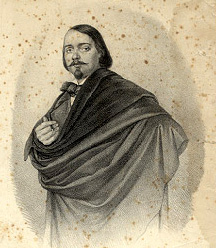
"Di quella pira" is a short tenor aria sung by Manrico in act 3, scene 2, of Giuseppe Verdi's opera Il trovatore. It is the last number of the act.
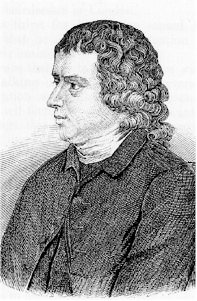
"Come Thou Fount of Every Blessing" is a Christian hymn written by the pastor and hymnodist Robert Robinson, who penned the words in the year 1758 at the age of 22.
Lo, the full, final sacrifice is a festival anthem for SATB choir and organ, composed by Gerald Finzi in 1946. The work was commissioned by the Revd Walter Hussey for the 53rd anniversary of the consecration of St Matthew's Church, Northampton. Finzi orchestrated the piece for its performance at the Three Choirs Festival in 1947. Since then it has become a staple of the Anglican choral tradition. Performance time ranges between fourteen and eighteen minutes.

Vesting prayers are prayers which are spoken while a cleric puts on vestments as part of a liturgy, in both the Eastern and Western churches. They feature as part of the liturgy in question itself, and take place either before or after a liturgical procession or entrance to the sanctuary, as depends on the particular liturgical rite or use which is being observed.
Banishment or exile can be a form of punishment. It means to be away from one's home while either being explicitly refused permission to return and/or being threatened by prison or death upon return. It is a common theme within the Bible, beginning with Adam and Eve. Below is a partial list of these exiles as referenced in the Bible.
Yes, Lord! is the hymnal used by the Church of God in Christ. It was published in 1985 by the COGIC Publishing Board under the leadership of a on Bishop J.O. Patterson, Sr.
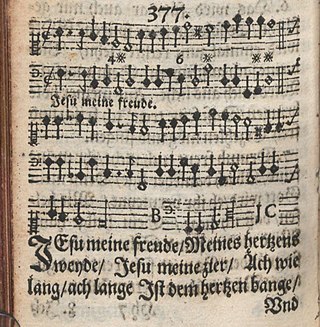
"Jesu, meine Freude" is a hymn in German, written by Johann Franck in 1650, with a melody, Zahn No. 8032, by Johann Crüger. The song first appeared in Crüger's hymnal Praxis pietatis melica in 1653. The text addresses Jesus as joy and support, versus enemies and the vanity of existence. The poetry is bar form, with irregular lines from 5 to 8 syllables. The melody repeats the first line as the last, framing each of the six stanzas.

"Day by Day " is a Christian hymn written in 1865 by Lina Sandell several years after she had witnessed the tragic drowning death of her father. It is a hymn of assurance used in American congregational singing.

Nothing But The Blood of Jesus is a traditional American hymn about the blood atonement and propitiation for sin by the death of Jesus as explained in Hebrews 9. The song was composed by Robert Lowry, a hymn writer who was a Baptist minister and professor at Bucknell University.

Christian universalism was a theology prevalent in the early United States coinciding with the founding of the Latter Day Saint movement in 1830. Universalists believed that God would save all of humanity. Universalism peaked in popularity during the 1820s and 1830s, and the idea of universal salvation for all humanity was hotly debated. Several revelations of the founder of the Latter Day Saint movement, Joseph Smith, dealt with issues regarding Universalism, and it was a prominent heresy in the Book of Mormon. Smith's father was a Universalist, while his mother was a traditional Calvinist, creating strain in the Smith family home.
"Awake My Soul and with the Sun" is a 17th-century hymn by the Anglican cleric and hymnodist Thomas Ken. It was written in 1695 as a morning hymn and, latterly, it is usually sung to the tune Morning Hymn by François Hippolyte Barthélemon (1741–1808). Occasionally, it is sung to Old Hundredth. Comprising 14 verses, ordinarily only the first and last three verses are sung. In 2002/2003, English composer John Rutter integrated the first and second verse into the Kyrie of his Mass of the Children.
